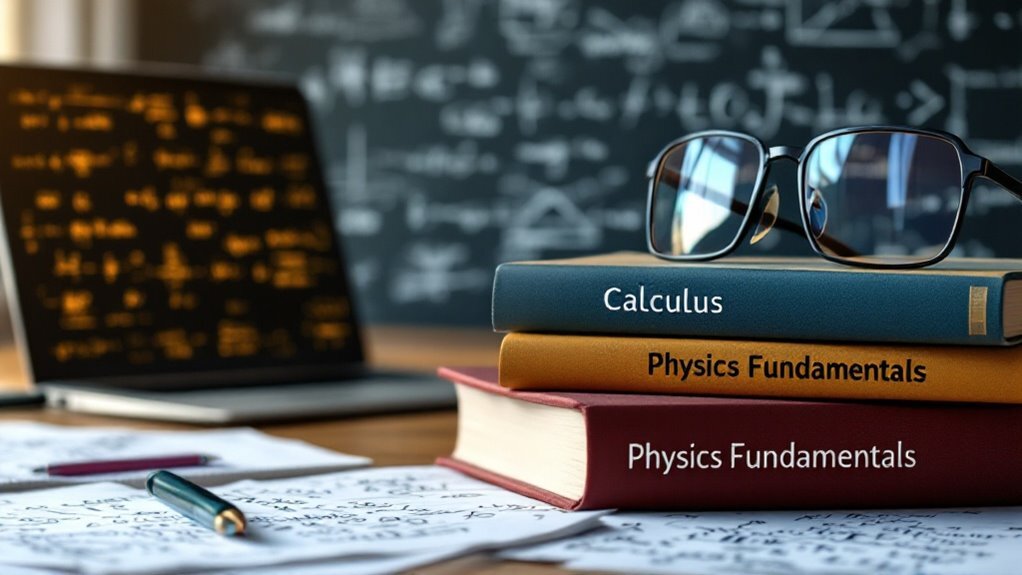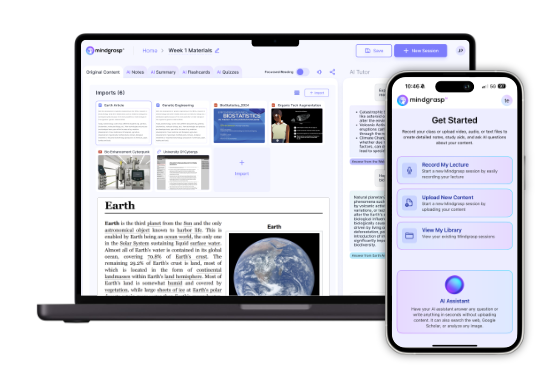
Yes, college physics usually requires calculus. It helps you grasp tough concepts like force and energy. Most courses expect you to either have completed or be taking calculus alongside physics.
You’ll need a solid math background—think of it as a workout for your brain! Plus, labs and real-world problems make it more fun (science really can be cool!).
If you want to know more about what to expect, just hang tight, there's more ahead!
Key Takeaways
- College physics courses, especially calculus-based ones, typically require prior completion of calculus courses like MATH 198 or MATH 210.
- Many institutions allow concurrent enrollment in calculus and physics, which is often recommended for success.
- A minimum grade of C in calculus is usually necessary to ensure a solid math foundation for physics.
- Calculus is essential for understanding advanced physics concepts like energy conservation and motion equations.
- AP Physics C: Mechanics specifically advises students to be enrolled in calculus concurrently to grasp the material effectively.
Boost Your GPA Faster with Mindgrasp
Instantly turn your class notes into smart summaries, flashcards, and quizzes—study less, learn more, and ace your exams.
Try it FreeOverview of Calculus-Based Physics Courses
When you think about studying physics, especially calculus-based physics, it might feel a bit intimidating at first—but don't worry!
Calculus applications in physics help you tackle real-world challenges, like understanding motion and energy. You'll plunge into core topics like mechanics and electromagnetism.
Here’s what to expect:
-
Two-semester courses, often split into mechanics and waves.
-
A focus on problem-solving—think of it as a workout for your brain!
-
You'll learn about conservation laws (momentum and energy) that are essential.
With practice and some patience, you’ll conquer those physics challenges and build a strong foundation for your STEM career! Additionally, using tools like Mindgrasp's features can greatly enhance your study experience.
Prerequisites for Enrollment
Before you jump into calculus-based physics, you’ll need to have some calculus under your belt—like MATH 198 or MATH 210.
But don’t worry; many schools let you take calculus at the same time as physics, which is pretty cool!
Just remember, getting a C or higher is usually a must, so keep your math game strong!
Calculus Completion Requirement
Calculus completion is a big deal if you’re planning to immerse yourself in college physics courses! Many colleges require you to have a solid math foundation, especially in calculus, before you immerse yourself in physics.
Here’s what you need to know:
-
Courses like mechanics and electricity often need calculus prerequisites.
-
AP Physics C: Mechanics recommends concurrent calculus enrollment.
-
Some colleges set specific calculus requirements for core physics sequences.
Getting comfortable with calculus applications will make your physics journey smoother.
Corequisite Enrollment Options
Corequisite enrollment options in college physics can make a big difference in how you tackle your studies. These options often pair lab courses with lectures, which means you get hands-on experience. That’s one of the corequisite benefits!
However, you might face corequisite challenges, like needing a minimum grade to stay in the course.
Here’s a quick rundown:
-
Lab pairing reinforces skills.
-
Institution policies vary—some are strict!
-
Grade requirements can impact your path.
Navigating these can be tricky, but they help guarantee you're ready for the next level.
Try Mindgrasp for Free!
Experience an easier, faster way to boost your GPA. Sign up now to try Mindgrasp AI for free and see how AI-powered learning transforms your study routine.
Try it FreeCourse Structure and Content
When you jump into a physics course that uses calculus, you’re in for a mix of exciting topics and hands-on labs!
You’ll tackle core physics ideas like Newton’s laws and energy conservation, all while crunching numbers and analyzing data.
Plus, those lab sessions? They’re not just busywork—they’ll help you see how theory plays out in real-world situations, making everything click into place!
Core Physics Topics
Core Physics Topics plunge into the fascinating world of physics without needing a calculus background. You can explore essential concepts through an engaging Physics Curriculum that focuses on:
-
Core Mechanics: Kinematics, dynamics, and circular motion, all using algebraic equations.
-
Energy and Momentum: Work, energy, and momentum calculations are straightforward, using simple formulas.
-
Fluids and Thermodynamics: Learn about pressure and Newton's laws without diving into complex math.
These topics provide a solid foundation for understanding physics without the stress of calculus, making it accessible and fun for everyone!
Laboratory Integration Methods
Laboratory Integration Methods really bring physics to life!
You’ll immerse yourself in hands-on experiments that connect classroom theories to real-world engineering challenges. Using effective laboratory techniques, you'll explore energy transformations, kinematics, and Newton’s laws.
Here’s what you can expect:
-
Design experiments with controlled variables—no surprises!
-
Use statistical tools to validate your findings.
-
Compare traditional and modified instructional methods for better understanding.
Laboratory Integration and Experiments
Physics labs can be a blast, especially when you immerse yourself in the world of calculus!
Physics labs are thrilling, especially when you dive into the exciting realm of calculus!
When you plunge into lab techniques and experimental design, calculus helps you make sense of complex data. Here are three key ways it enhances your experience:
-
Analyzing Motion: You’ll derive equations for phenomena like torque and angular acceleration.
-
Graph Interpretation: Software tools often require you to understand slopes and areas under curves.
-
Guided-Inquiry Labs: You'll focus on deriving relationships through iterative data analysis, making calculus concepts essential.
Skill Development and Outcomes
When you plunge into the world of calculus in your physics courses, you're not just crunching numbers—you're building some serious skills! You’ll get better at quantitative analysis, which helps in everything from understanding motion to energy calculations.
Here’s what you’ll gain:
-
Stronger problem-solving abilities through skill assessment
-
A solid grasp of concepts like force, torque, and wave motion
-
Enhanced communication skills to articulate your findings
These skills aren’t just academic; they prepare you for real-world challenges.
Institutional Variations in Prerequisites
Maneuvering the world of college courses can feel a bit like solving a puzzle, especially when it comes to prerequisites for physics classes. You’ll find significant prerequisite differences across institutions, which can affect your course path.
Here are a few things to take into account:
Consider these key factors when planning your physics coursework to ensure a smooth academic journey.
-
Some colleges require Calculus I before you can enroll in Physics I.
-
Others might let you take Calculus and physics together, which is super handy!
-
Always check if your grades meet the minimum, so you don’t miss out on those course equivalencies.
Navigating these differences can help you plan your academic journey more effectively!
Conclusion
So, to wrap it up—yes, college physics often needs calculus! It's like trying to play video games without knowing the controls; you’ll miss out on a lot. Here’s the scoop:
- You'll deal with formulas and concepts that really benefit from calculus.
- It helps you understand the “why” behind the “how.”
If you're up for the challenge, it's totally worth it. Just grab some study snacks, and jump in! You got this!
Download Mindgrasp from the App Store
Access Mindgrasp at your desk for in-depth research and writing projects, or use the mobile version to easily access your content on-the-go or record live lectures.
Download the iOS App
